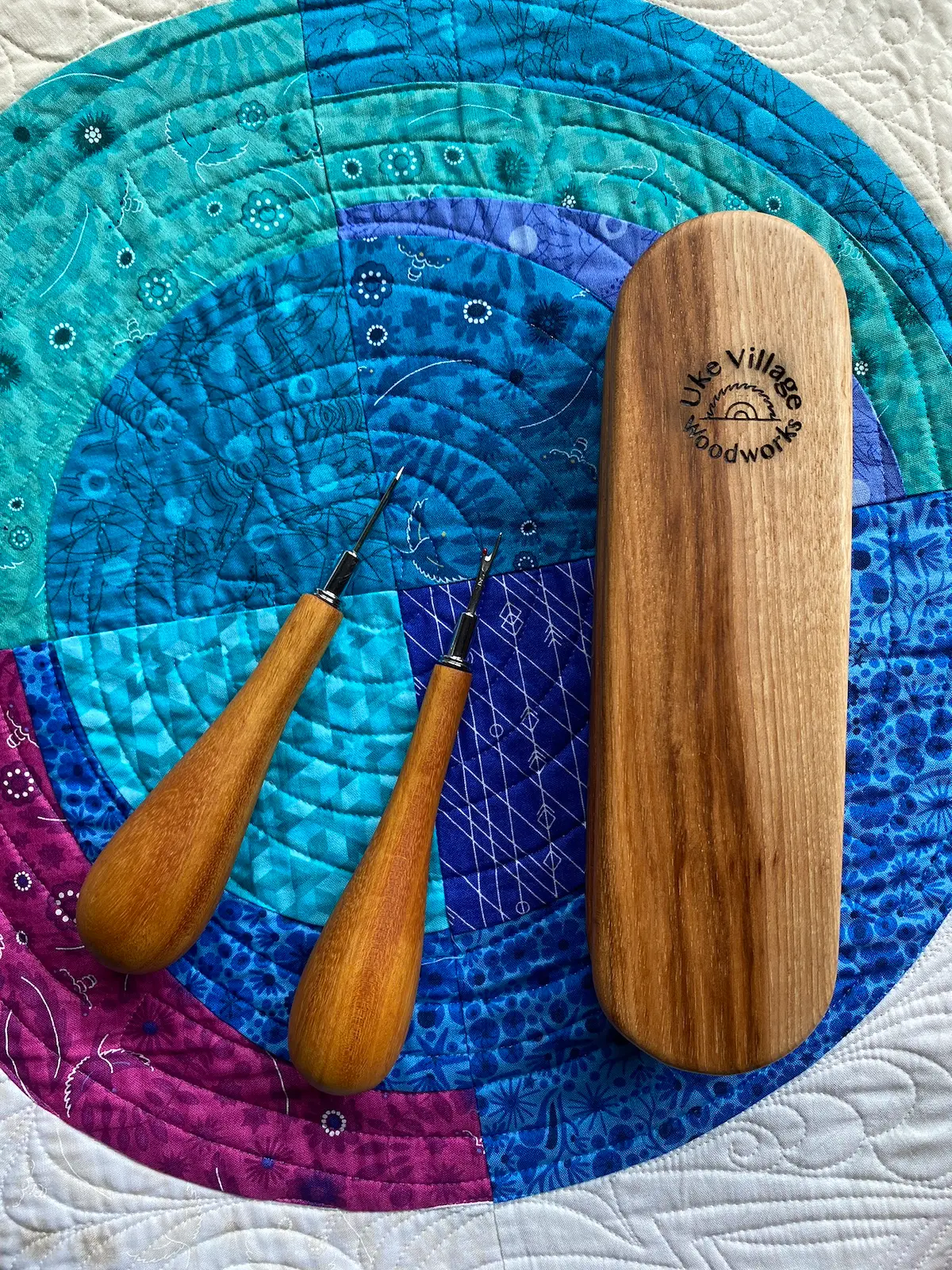Jessica Bobrowski and Michael Jacques are the creative duo behind Uke Village, where quilting meets woodworking with a touch of music and play. They inspire each other, making handmade tools that spark joy in the quilting community.

Q: What were your first creative memories as kids? Did you grow up surrounded by making and who encouraged your creativity when you were just starting out? Did you have a light bulb moment when you thought that this is what I want to do?
Jessica: I’ve always been a maker of things. My siblings and I did a lot of imaginative play and didn’t really have a good television, so there was a lot of time for imaginative play.
My mother was very artistic, had a BFA in ceramics, and was an adept garment sewer. We always had art supplies around the house and making things was an encouraged activity. I think I have just always been creative.
My first thought when I need something is “can I make it myself?” I have always been a collector of things that are interesting and can be repurposed; creativity is part of my everyday life. My mom was a big part of that because making was just something that we did in our family.
As an Amazon Associate I earn from qualifying purchases. Read more about our affiliate linking policy.
Michael: I grew up with a suburban, lower class lifestyle. Some of my earliest creative memories were around making Christmas gifts for my family. It was a pretty interesting experience as a seven or eight year old child to be making presents instead of going out and buying them.
It was early exposure to creativity, but there was really not a lot of support for creativity in my family, except for my grandfather. He’s the one who introduced me to woodworking and inspired me to actually start making things.

Q: Which came first? Jessica Quilting or Michael and Woodworking?
Michael: Jessica has been quilting far longer than I’ve been doing woodworking. I’ve been actively woodworking for about 10 years.
Jessica: I’ve been quilting since I was 18, so I’ve been quilting for 32 years if we do the math. My grandmother was a quilter, and when I started college, I needed to do something creative to balance out the biology and chemistry courses I was taking. Quilting seemed like a natural pursuit to me.
Michael: Despite an early love for woodworking once I started raising kids and building a career I didn’t have time for hobbies. When Covid hit I got laid off from my well-paying sales enablement job and then got laid off 3 more times before 2024.
Between jobs, I started doing more woodworking until eventually the job offers dried up and I needed to seriously begin to change my career to continue to sustain myself. Four layoffs with 9 to 12 months in between jobs devastated my savings, and I had to do something to get money rolling in. That’s when the idea of Uke Village came to life.
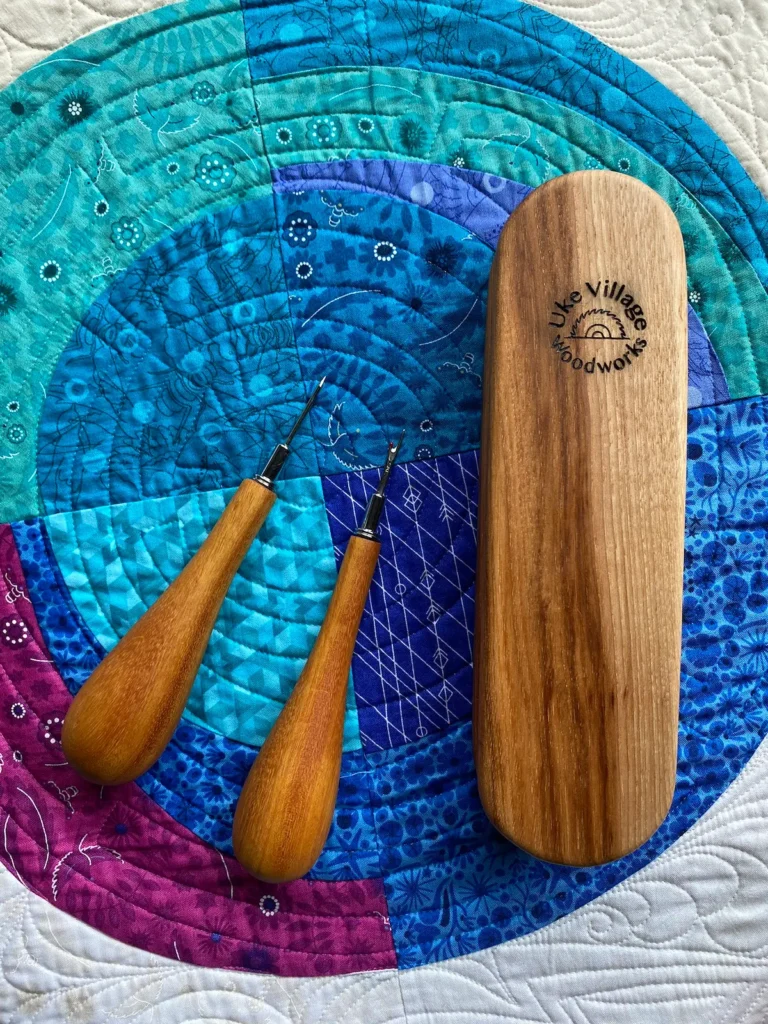
Q: How did your paths cross, and how did your creative journeys begin to overlap?
Michael: We actually met on a dating app, had a few dates and hit it off, and decided that we wanted to explore this relationship a bit further. We have a lot of similarities in tastes and ideas, and opinions. We have a deep compatibility, I would say, that kind of encouraged us to start this journey together.
Jessica: Yes, I feel like we talked so much about music when we were first getting to know each other, because music is such a big part of both of our lives and our connection with the world. Music discussions led to questions about what other things do you like to do?
Michael makes lots of other kinds of art. We have little sculptures around our house. I make lots of other kinds of art. I dabble in so many mediums like photography, watercolor, collage, and gardening. I feel like in our relationship and how we view the world, there is a real open space for creating something out of everyday objects, repurposing things in a creative way that I have never found with other people.
There’s a mutual natural curiosity about “what is this?” and “what could it be?” This is really fun and creates a liveliness to the ‘every day’ for us.
Michael: And our creative journeys began to overlap, just kind of out of the blue one day. Jessica says, “hey, I bet you could make one of these.” And she showed me a picture of a clapper. And I looked at that and thought, yeah, that looks pretty simple. I could probably make that.
So I got a chunk of wood and I cut some grooves down the side and rounded it off and that was our very first quilting tool. And I thought that was so cool.
The whole idea of making tools specifically for quilting was such an eye-opener for me. I was like, “What else you got? How many other tools can I make?” And that’s when Jessica’s quilting experience really came to life for me. Most of what I make are ideas from Jessica. She does all the testing and all of the approvals to make sure that we do have a product that is useful and feels good.
Jessica: Yeah, I remember now, I had a quilt in a local quilt show. Michael had never been to a quilt show and was game to come and see my quilt. That is when we were walking up and down the aisles looking at all the quilts, seeing all the people that were there for quilts. Michael turned to me and said, “Oh, I didn’t know so many people were into this.” And I said “You have no idea!”
Uke Village has been a sort of kismet kind of back-and-forth thing – with Michael doing the heavy lifting, in my opinion.
Michael: Well, I do all the manual work, all the fidgety bits, but the ideas and the direction comes from Jessica. She kind of keeps us going in the right direction because she’s got her thumb on the quilting community, and she knows what they need, how much they’re willing to pay for it. You know, yeah, it’s been exciting.



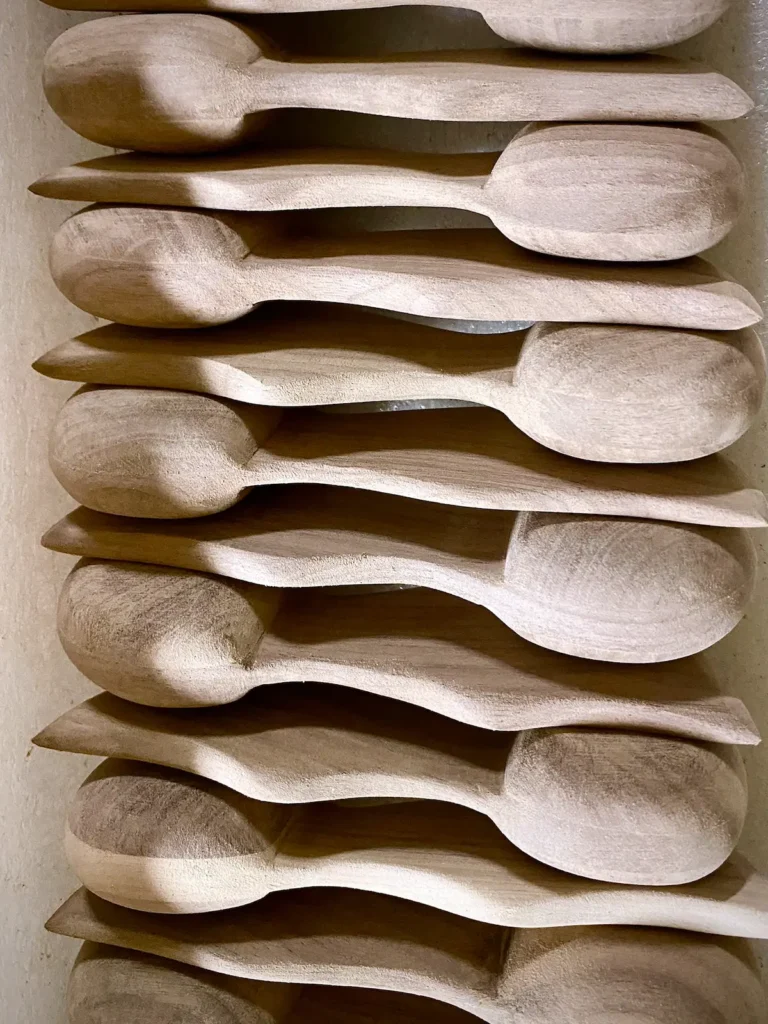
Q: Do you see yourselves as collaborators or more like two parallel makers supporting each other?
Jessica: I see us as collaborators because getting to work with Michael brings things that are in my head into the physical world. With a design partner there is an unquantifiable part where one person’s idea combines with another’s to make something way better than either of the first two ideas by themselves.
Michael takes our ideas to the next level. For example, his Hera marker design it doesn’t exist anywhere. He is not a quilter and made this thing that does the work of a regular plastic Hera marker, but it is beautiful and feels good in your hand. People gravitate toward it and are really excited about what all they can use it for.
Michael: I agree. It’s totally a collaboration. I wouldn’t be able to do what I’m doing without Jessica. And I like to think vice versa as well.
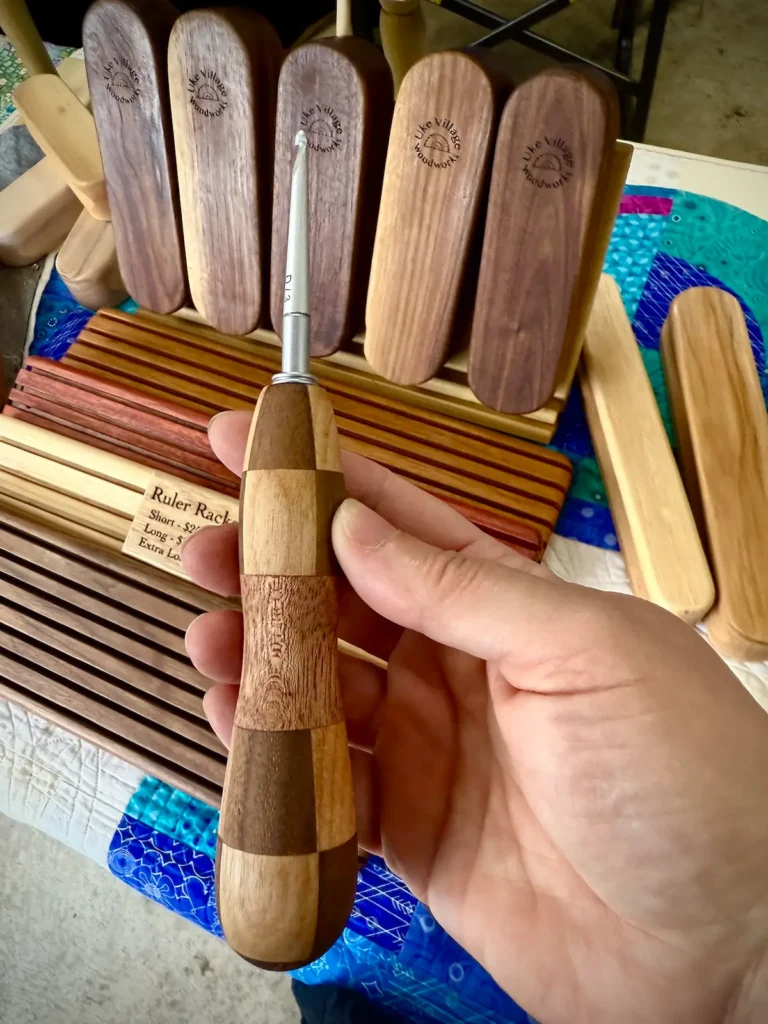
Q: How do you inspire and challenge each other creatively?
Michael: I think our support and inspiration comes by creating an environment of creativity, where we are surrounded by things to make art, things to make music, things to make food.
We love creating things and we are never critical or judgmental about our efforts. We know that everything is a work in progress and, you know, you make it first, and then you can make it good as time goes by. So I think we have that atmosphere of support around creativity that makes it enjoyable for both of us.
Jessica: Oh, I totally agree. I think that the way we live just engenders more ideas and making space to be in the process of creating. I think in other situations for me, the process of being creative that’s been frowned upon, or I have felt I have had to steal time from things that were “productive”, but I feel like with Michael, we’ve made space so that it is all part of the process. Being expansive like this makes space for new ideas and possibilities that were not able to be even dreamed about before.

Q: How did the name Uke Village come about?
Michael: Our neighborhood is actually called Uke Village. Our home and workshop is located in the Ukrainian district of Springfield, Oregon. Oregon Live just did a story about our neighborhood, about its origins and evolution, and all of that. And, you know, we’ve been living here for about, I’ve been here for about 10 years, and even just over that time, there’s been a lot of change. We went from basically a Russian-themed neighborhood to a Ukrainian-themed neighborhood. So I really enjoyed that aspect of the neighborhood. So we decided to use Uke Village Woodworks as the name of our little company.
Jessica: Well, I also like that the “Uke” could tend towards our musical selves too, because it’s kind of like ukulele. The name creates an opportunity for conversation with people and that’s fun.
Michael: And another little bit of synchronicity, the very first wood project I made was a ukulele with a local luthier, he had a little workshop that he did for a couple of weekends in a row, and I actually made a working ukulele. I don’t want to confuse the issue with our branding and all of that, there are no ukuleles being sold or made here anymore.
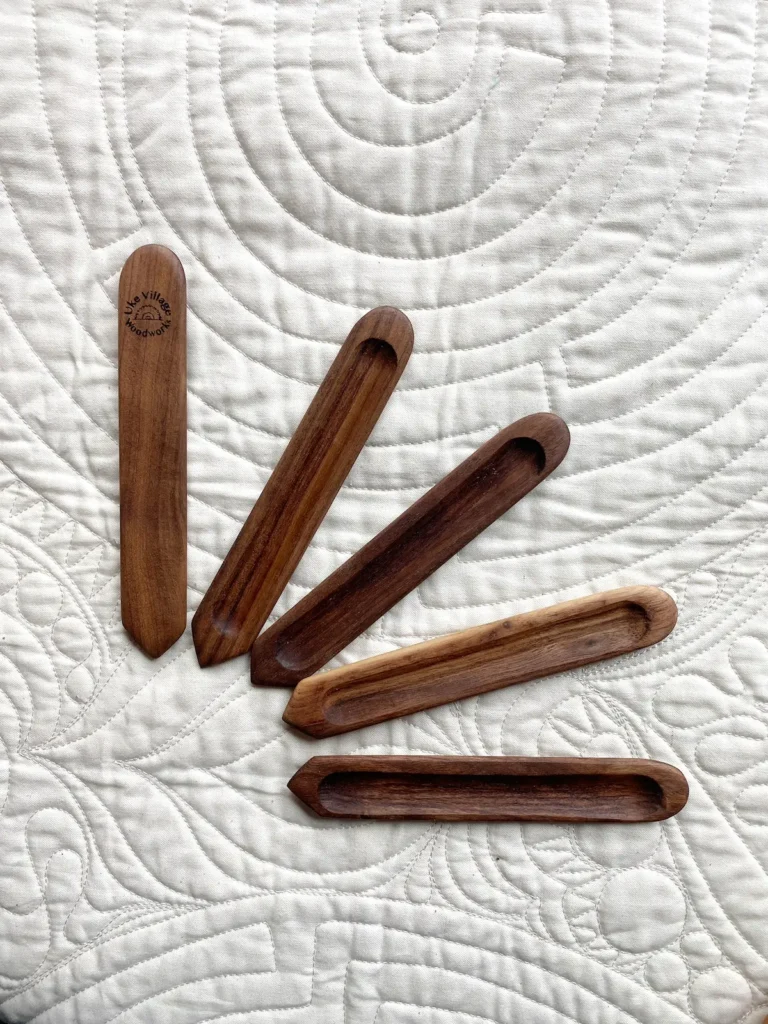
Q: What do you want people to feel when they touch one of your pieces?
Michael: So my pieces are all inspired by my grandfather’s tools. He had a set of vintage and antique tools hanging on the walls that just were amazing. They were well worn, they were solid, they were made from strong hardwoods.
And then I contrasted that with my dad’s tool kit, which was plastic handled Craftsman tools, if it was Craftsman, it was usually a cheap knockoff because we were poor. But I always noticed that difference in tools, and then as I grew up and started buying my own cheap tools, I was always sort of disappointed in the quality, even when I was buying Craftsman or nicer brands, it was still disappointing.
What I really want with my tools is to feel good in the hand. I want them to start out from an antique condition, but still have lots of life within them. I want a person to pick it up and go, wow, this feels good. And I want that to be a visceral thing for them so they can put it down and continue on and look at the quilts.
The whole time they’re thinking, wow, that Hera marker felt really good. And they keep thinking about it as they go. And before they leave, they come back and they feel a couple more and they get a couple. I mean, that’s really the ideal situation for me.
For instance, with our seam rippers, nobody likes to use a seam ripper, but when it feels good in your hand and it’s enjoyable to use, it makes those chores, you know, a little bit more enjoyable. You know, you’ll be looking for excuses to pick up your seam ripper.
And the other thing I like to say, I want my tools to inspire you to teach your grandchildren how to quilt so you can leave them as an heirloom. I’d love for these to last through multiple generations of use, because they already start off nice and smooth and strong and they’re just going to get more smooth as time goes on.
Jessica: I just tell people to touch the wood. They come up to the booth and I just say, “Oh, you don’t have to buy anything, but here, why don’t you feel it? It feels great.” And, you know, they walk away with a tool or two. Or three.
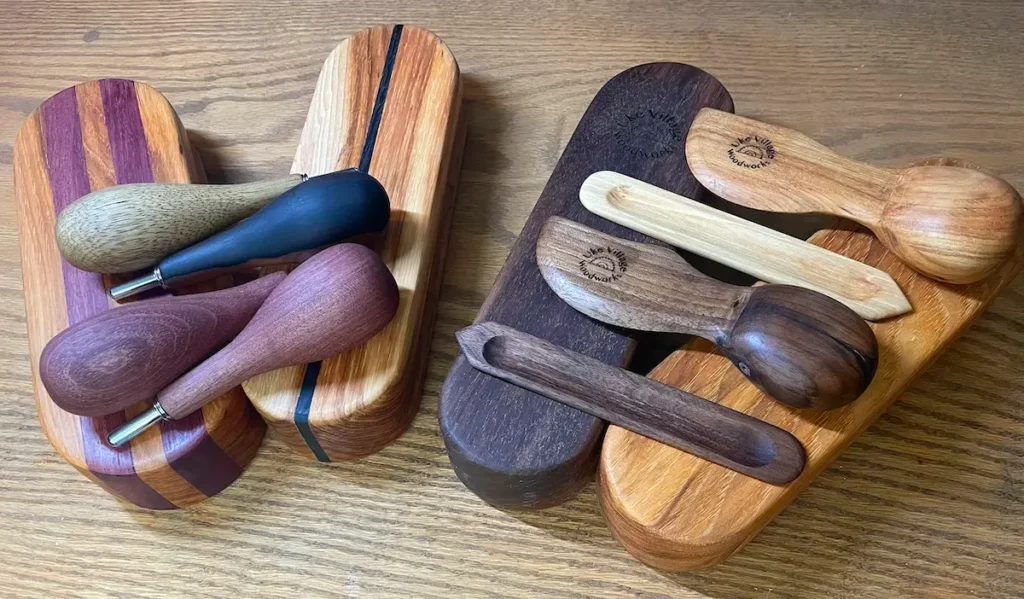
Q: Describe each of your creative spaces. Do you have separate workspaces or share a workspace?
Michael: Well, we share a home, but we do have separate workspaces.
The woodshop is located in the garage, essentially. So all of the mess and sawdust is consolidated there, whereas the rest of the house is just kind of given over to arts and crafts in general.
We do have a spare bedroom, though, that we are planning on cleaning out so we can have a little crafts room up there. It’s just a question of, you know, consolidating two different households into one. We have a lot of stuff for making things.
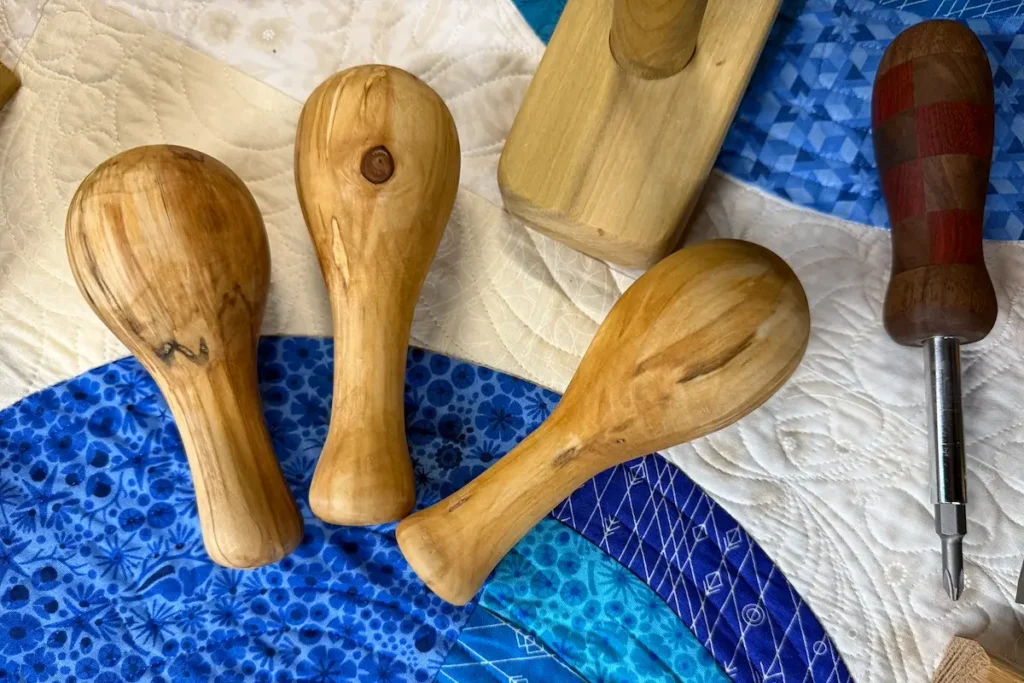
Q: How do you split the day to day running of Uke village, (making, shop, shipping, emails)?
Michael: I’d say Jessica is kind of the marketing arm of Uke Village, whereas I’m the one in the shop, the production arm. I’m the one who makes all of the product. I ship the product. I ride my bike over to the post office and drop it off in the mail.
Jessica usually handles all of the emails, any communications with vendors or with quilt shows and vendor representatives. She does our social media. She does a great job on our website. I do all the wood shopping myself because I absolutely love shopping for wood.

Q: Which of you is the big picture planner, and which is the detail person or do you swap?
Michael: I’m not sure we have a big picture planner or a detail person. I think we both kind of do a little bit of that. And I think we create a third sort of perspective when we combine our thoughts, you know, so I think that we have a combined personality that does all that big picture planning in, you know, making sure that the details are clearer.
Jessica: Yeah, and I think that it’s going to continue to evolve and grow as the business evolves and grows, because I feel like right now we’re still in the baby business stage, and we both have decided, ooh, we really like this baby. And so, you know, who knows what is to come?
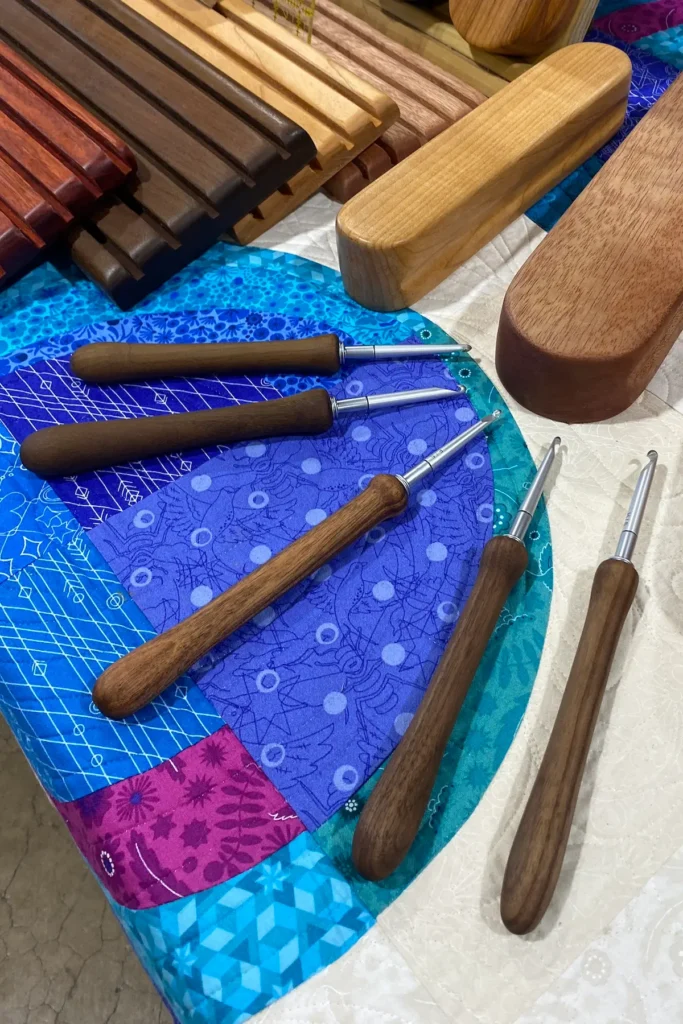
Q: How do your dogs in home life fit into the creative routine? Are they part of the Studio vibe?
Michael: No, they’re a bunch of lazy bums. They just sit around all day. They nag me for treats at noon and at four.
Jessica: And you love every minute. I also think that their attentions and affections can help get us into the world rather than just in our brains.
Michael: Yeah, they provide the emotional support that we desperately need.
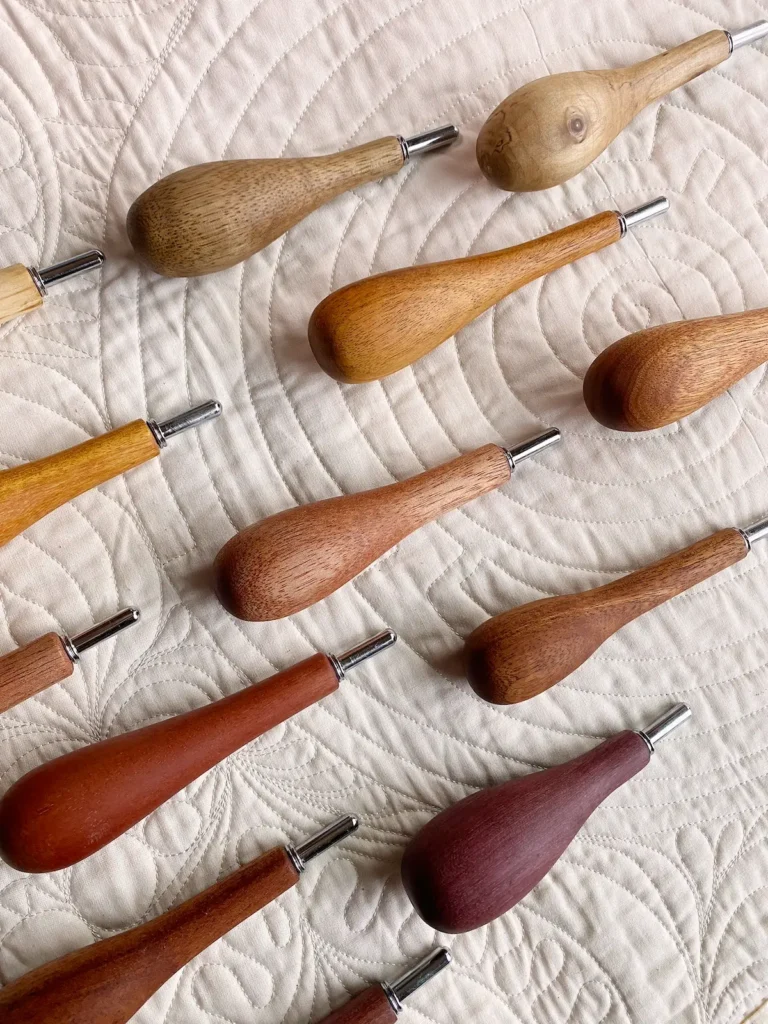
Q: How do you keep going during a tough, creative spell or when orders pile up?
Michael: Well, orders don’t pile up. We’re very new. I’d love to have that problem, but yeah, we’re not burning down the post office here. And I’m not even sure that we have tough creative spells.
I recently had an injury where I was not able to do any woodwork for a couple of weeks. And that was a bit stressful because we do have a quilt show coming up next weekend. I was planning on spending the month before the show making pieces and coming up with some new stuff. But because of the injury, I wasn’t able to do that. And so now I’ve got two weeks essentially to make stuff. You know, that sort of thing, it’s really just a question of keeping the goals in mind.
I’m doing this because I love working with wood and I love making tools. I love going to these quilting shows and interacting with people. I’m not expecting this to make me rich, you know, so that sort of stress, it’s not my day job, essentially, or my night job, as it were. So the tough creative spells are really not as serious as for somebody who’s relying on this to pay their mortgage and raise their family.
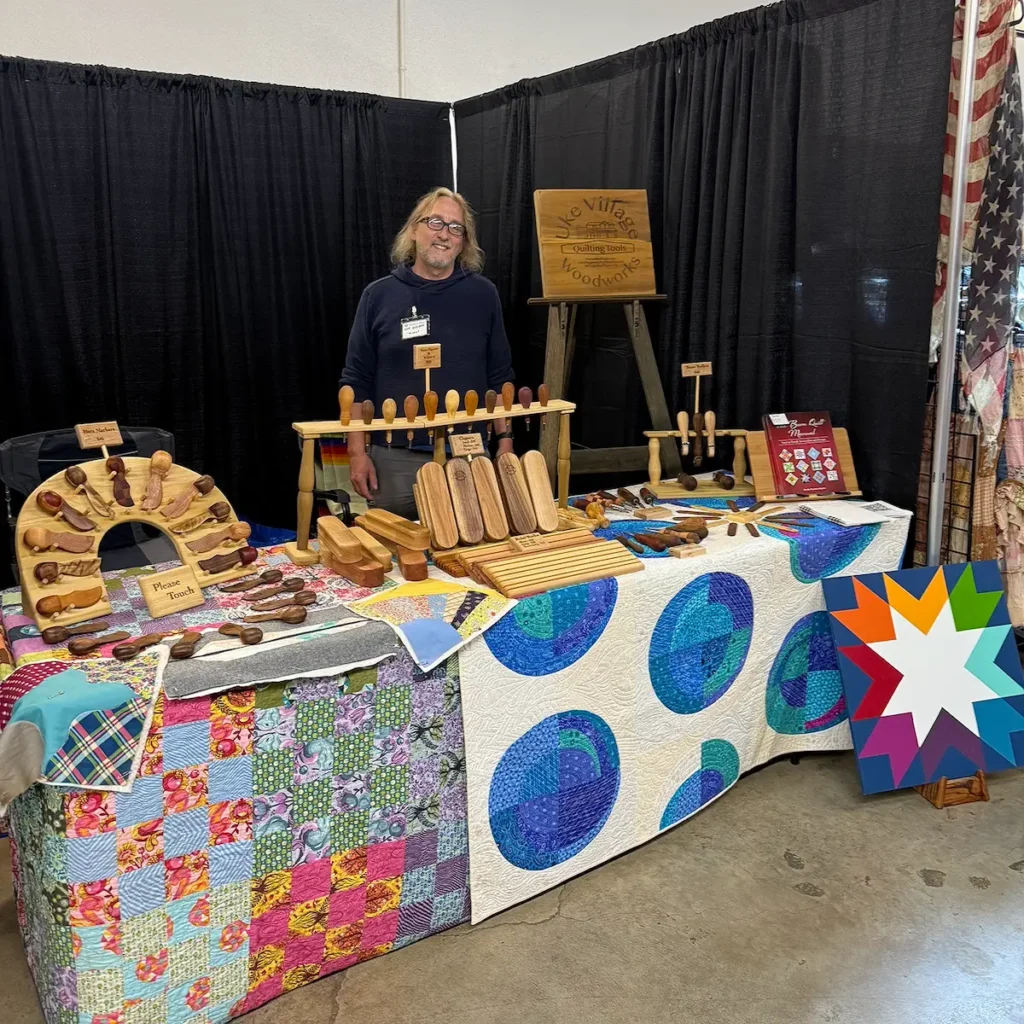
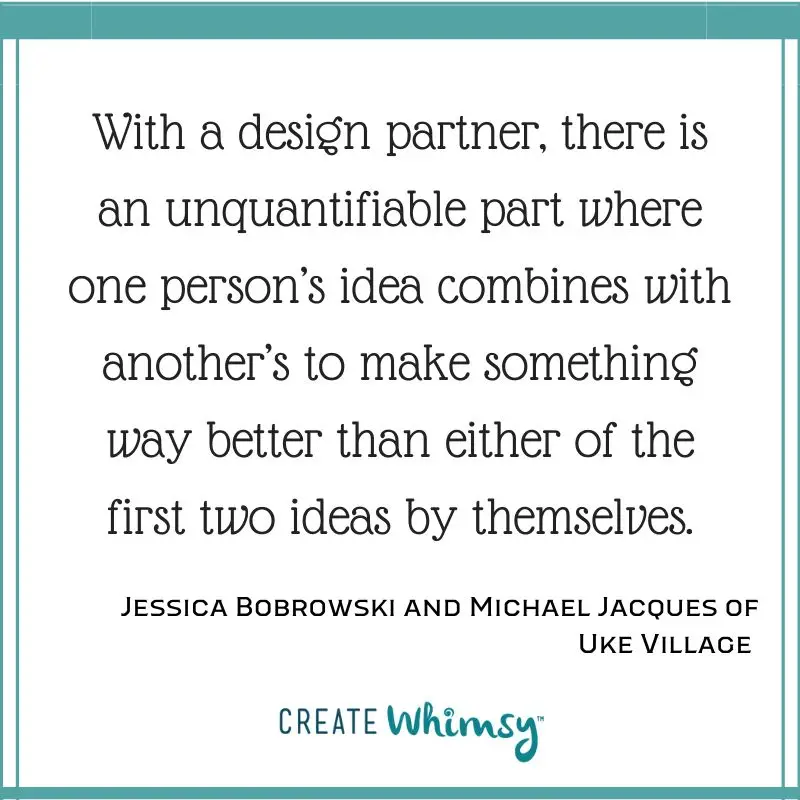
Q: Where can people see your work?
Jessica: People can see our work at local quilt shows in the Oregon area. I bring a bag to my guild meetings if people want to look. Online we have our website, ukevillage.com, and our Etsy shop.
Michael: The best place to see us is in person at any of the quilting shows. We try to hit every quilting show in Oregon, and we’ll spread out into Washington and possibly Northern California at some point. So yeah, come out and see us at the quilting shows, and we’re happy to talk to you even more.
Jessica: And I also think that the best way to quote “see” our work is in person because then you get to touch it, and then you’ll know that you want it.
Michael: And smell it and hear everybody else talking about it as well.
Jessica: Yeah. Tell us about your grandpa story because my grandfather was also a woodworker, and it seems like everyone’s got a woodworking grandpa story.
Micahel: At our last quilting show, we donated a set of tools for the raffle. Throughout the weekend, we had one woman who kept coming up to our booth, and she just loved our stuff, but she wasn’t quite ready to pull the trigger yet. She didn’t know what she wanted to get, and she just waited and waited and waited all weekend long. And then when they called the raffle, she was the winner of that raffle. She was so excited. We got a little video of that, but she was just so excited about it that it just made my heart warm.
Jessica: And she came and asked you to autograph her clapper.
Michael: Yeah, I actually autographed the clapper. And then she bought a couple of other things from us as well. So that felt really good. That somebody was that excited about our work. That’s the sort of thing we like. We love those interactions with people. I love hearing about people who have been using the tools and enjoying the tools, and buying tools for their friends.
These are collectibles, so don’t be afraid to get two or three of each.
Interview posted September 2025
Browse through more inspiring interviews on Create Whimsy.

